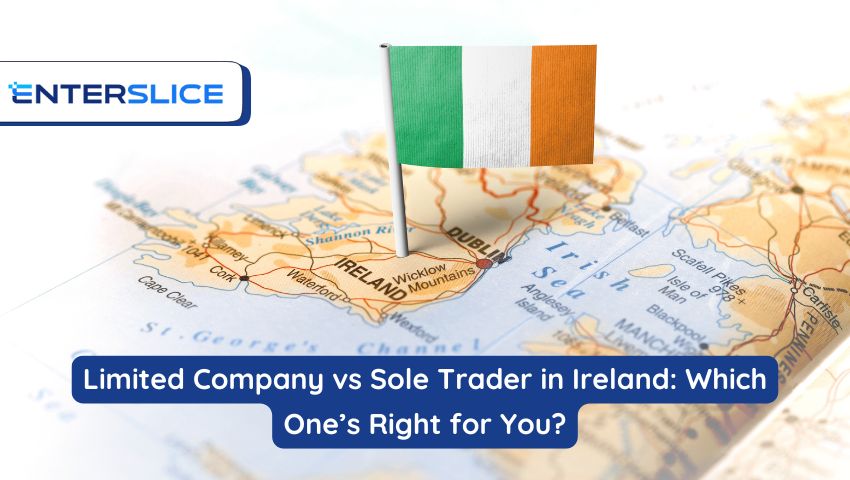Limited Company vs Sole Trader in Ireland: Which One’s Right for You?

Strong 8k brings an ultra-HD IPTV experience to your living room and your pocket.
When starting a business in Ireland, one of the first and most critical decisions you'll face is choosing the right business structure. Most entrepreneurs find themselves weighing two primary options: setting up as a sole trader or forming a limited company. Each structure has its own advantages and limitations, and the best choice depends on your business goals, risk tolerance, and long-term vision.
In this guide, we’ll explore the differences between sole traders and limited companies, examine the pros and cons of each, and help you determine which option suits your situation best. Whether you’re just beginning your entrepreneurial journey or looking to restructure your business, understanding the nuances of company registration in Ireland will ensure you start on the right foot.
What Is a Sole Trader?
A sole trader is the simplest form of business in Ireland. It involves a single individual who owns and runs the business. There's minimal paperwork required, and it’s easy and fast to get started.
Advantages of Being a Sole Trader:
- Quick Setup: Registration is straightforward. You register your business name with the Companies Registration Office (CRO) and notify the Revenue Commissioners.
- Low Cost: There are minimal costs involved in setting up and maintaining a sole trader business.
- Complete Control: As a sole trader, you make all business decisions yourself.
- Simplified Accounting: Fewer compliance requirements compared to a limited company. Annual accounts can often be prepared without hiring an accountant.
Disadvantages of Being a Sole Trader:
- Unlimited Liability: You are personally liable for any business debts. If the business fails, your personal assets could be at risk.
- Limited Tax Efficiency: You pay income tax on your profits, which could be higher than corporation tax.
- Perceived Credibility: Some clients and partners may view sole traders as less professional than registered companies.
- Funding Limitations: Access to external funding and investment can be more challenging.
What Is a Limited Company?
A limited company is a legal entity separate from its owners. It requires formal company registration in Ireland, typically through the Companies Registration Office. You must appoint directors and shareholders, and the company is governed by the Companies Act.
Advantages of a Limited Company:
- Limited Liability: The business’s debts are separate from your personal finances. Your liability is limited to the amount you invest.
- Tax Benefits: Corporation tax in Ireland is 12.5% on trading income, significantly lower than personal income tax rates.
- Professional Image: Many businesses and investors prefer to work with limited companies.
- Investment Opportunities: It’s easier to attract funding or bring on investors through share issuance.
Disadvantages of a Limited Company:
- Setup Costs: There are costs involved in company formation in Ireland, including legal and professional fees.
- More Administration: You’ll need to file annual returns, maintain proper accounts, and may need to hire a company secretary.
- Less Privacy: Your company information (e.g., directors, financials) is publicly accessible through the CRO.
Also Read: Procedure for Online Company Registration in Japan
Key Differences Between Sole Trader and Limited Company
Feature Sole Trader Limited Company
| Feature | Sole Trader | Limited Company |
| Legal Status | Not a separate legal entity | Separate legal entity |
| Liability | Unlimited | Limited |
| Taxation | Income Tax (up to 52%) | Corporation Tax (12.5%) |
| Set-up Time | 1–2 days | 3–5 days |
| Annual Filing | Simple income tax return | CRO returns, director accounts |
| Credibility | Basic | More professional |
| Funding | Difficult to raise capital | Easier to attract investors |
When Should You Choose a Sole Trader?
Choosing to start as a sole trader may be ideal if:
- You're testing a new business idea with minimal financial risk.
- Your business is low-cost and has minimal liability.
- You want to keep things simple and avoid extensive paperwork.
- You’re freelancing or consulting on a small scale.
It’s also worth noting that many sole traders who experience growth later transition to limited companies to take advantage of tax planning and to protect their personal assets.
When Should You Choose a Limited Company?
Forming a limited company makes sense if:
- You’re planning significant growth or investment.
- You want to limit your personal liability.
- You're entering into contracts or deals that require a professional business structure.
- You want to reinvest profits into the business while minimizing your tax liability.
The process of company incorporation in Ireland is relatively streamlined and can be completed online with the assistance of formation agents or solicitors. While it involves a few more steps than becoming a sole trader, the long-term benefits can outweigh the initial complexity.
How to Register a Company in Ireland
To proceed with company formation in Ireland, you will need to:
- Choose a Company Name – Ensure it’s unique and not too similar to an existing business.
- Prepare Incorporation Documents – These include Form A1 and a Constitution document.
- Appoint Directors and Shareholders – At least one EEA-resident director is required unless you have a bond or assurance certificate.
- Register with the CRO – This can be done online via CORE.ie or through a formation agent.
- Register for Tax – Once registered, your company must apply for tax registration with the Revenue Commissioners.
Once you’re incorporated, you can open a business bank account and begin trading as a limited company.
Also Read: Documents Required for Company Registration in New Zealand
Which Option Is Right for You?
The decision between becoming a sole trader and setting up a limited company depends on several factors, including the nature of your business, financial risk, growth plans, and personal preferences.
If you're aiming for simplicity, minimal cost, and have limited risk exposure, a sole trader structure may be perfect to get started. However, if you're seeking greater protection, tax efficiency, and long-term scalability, a limited company is likely the better option.
Consider speaking to a professional advisor before making your final decision. The right structure can save you both time and money in the long run and ensure your business complies with Irish regulations.
FAQs
1. How long does company registration in Ireland take?
Typically, company registration in Ireland takes between 3 to 5 working days if all documents are correctly submitted. Using a company formation agent can help speed up the process and reduce the chances of errors.
2. Can I start as a sole trader and later become a limited company?
Yes, many entrepreneurs begin as sole traders and later transition to a limited company once their business grows. The transition involves closing your sole trader tax registration and going through company incorporation in Ireland with the CRO.
3. Do I need an Irish address for company formation in Ireland?
Yes, to complete company formation in Ireland, you must provide a registered office address in Ireland. This is where official correspondence will be sent. If you don’t have a physical office, you can use a virtual office or registered office service.
Conclusion
Choosing the right business structure is one of the most important early decisions you’ll make. Take your time to evaluate your current situation and future plans. Whether you choose to go the sole trader route or proceed with company incorporation in Ireland, ensure your setup aligns with your business goals and legal obligations.
Note: IndiBlogHub features both user-submitted and editorial content. We do not verify third-party contributions. Read our Disclaimer and Privacy Policyfor details.





